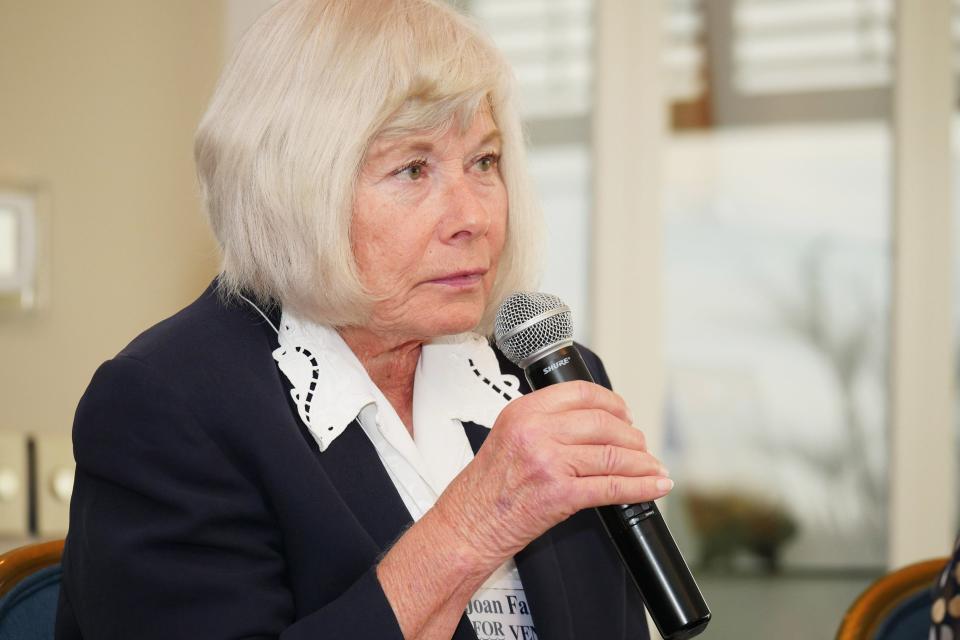Venice council declines to join lawsuits opposing new personal financial disclosure law

VENICE – The Venice City Council declined to join other local governments in lawsuits challenging a 2023 law requiring municipal officials to disclose their personal finances at the same level of detail as county commissioners, school board members and state legislators.
While all seven City Council board members oppose the concept of fully disclosing their net worth, they balked at the thought that joining the suit would jeopardize the city's receipt of state funding.
At stake for the city in the current state funding package is $750,000 that would help cover about half the cost of extending a new utility force main from the island of Venice under the Intracoastal Waterway.
City Council Member Joan Farrell brought the matter up, asking her colleagues to direct city staff to sign on to the state lawsuit, which would have cost at least $10,000.

While Council Member Ron Smith seconded her motion for discussion, it failed on a 6-1 vote.
Rather than join the suit, a majority of the council said it would be more effective to lobby local state legislators about changing aspects of the law.
A lose-lose proposition
Vice Mayor Jim Boldt said he attended a Florida League of Cities presentation on the proposed suit, at which the organization's president Greg Ross – an attorney, as well as mayor of Cooper City – explained that he advised his own city against joining the suit.
“He simply said, 'I’m a lawyer, I’ve looked at this, they’re not going to win,'” Boldt said.
In addition, Assistant City Manager James Clinch told the council that Chris Schoonover, the city’s lobbyist with City Consulting, advised that joining the suit would result in the deletion of the potential $750,000 in funding and could jeopardize future grants.
The $1.5 million project would extend a second 14-inch force main for sewage transmission.
Farrell took issue with the consultant's advice.
“I am embarrassed, appalled, alarmed at this advice from the Capital City Consultants, I am just outraged,“ Farrell said. “This is corruption, when we are told that if we want to do the right thing for ourselves, we are going to hurt our citizens.
“It is putting us in handcuffs, pitting us against our own constituents,” she later added.
Boldt, who chaired the meeting because Mayor Nick Pachota and City Manager Ed Lavallee were traveling to Washington, D.C., to lobby federal legislators for money to help move Fire Station 52 and the ongoing beach renourishment program, had a different perspective.
He considered the Form 6 disclosure an issue for individual elected officials but not something that city taxpayers should fund.

“We were elected by the constituents to represent them,” Boldt said. “We’re not representing them in this case, we’re costing them a bunch of money.”
Council Member Helen Moore called the Form 6 requirement “despicable overreach” but the cost of joining the suit was too high, given the assumption that it could jeopardize the awarding of state grants.
She added that if individual council members wanted to contribute to funding the lawsuit, “go for that.”
Lawsuits argue Form 6 requirement violates privacy rights
Municipalities and dozens of local elected officials from across Florida filed state and federal lawsuits last month challenging the law's constitutionality.
The lawsuits, filed in Leon County circuit court and federal court in South Florida, contend that the disclosure requirement violates privacy rights under the Florida Constitution and First Amendment rights under the U.S. Constitution.
Farrell was hoping that Venice would join at least one of those suits.
Council Member Rick Howard said the law should have allowed elected officials in office to finish out their terms without filling out the form.
More than 100 municipal officials resigned because of the disclosure requirement, according to the Weiss Serota Helfman Cole + Bierman law firm, which filed the lawsuits.
The lawsuits name as defendants members of the Florida Commission on Ethics, which administers and enforces disclosure laws. Plaintiffs in the lawsuits include officials and communities ranging from Miami Springs to Destin.
What must local elected officials now disclose?
The new law, which passed last year as Senate Bill 774 and went into effect in January, requires local elected officials to reveal their net worth, including bank accounts, retirement accounts and other investments, as well as the value of household goods and personal effects.
Boldt noted that the deadline to fill out the form is July 1.
One Longboat Key Town Commissioner and one Bradenton Beach city commissioner resigned in December, rather than fill out the form.
Last year, in the city of Anna Maria, three of five candidates vying for appointment to two empty council seats dropped out of the running because of the new requirement.
Legislative changes unsuccessful
State legislators quashed amendments that would have pushed back the effective date of the requirement to 2025 and exempted officials in communities with 500 people or fewer.
During a March 1 floor session, the House eliminated the amendment, ensuring that the disclosure requirement passed last year would remain intact. The underlying bill also died as the legislative session that ended Friday.
Rep. Spencer Roach, a North Fort Myers Beach Republican who led the effort to prevent changes in the law, said during the floor session that it is an “issue for me of transparency.”
“This Legislature has spoken on this issue with one voice, and that voice needs to be respected,” Roach said.
But Rep. Yvonne Hinson, D-Gainesville, said close to 20 officials in her district have resigned because they don’t want to fill out the detailed financial-information forms, known as a “Form 6.”
Information from the News Service of Florida was used in this report.
This article originally appeared on Sarasota Herald-Tribune: Venice opts against legal challenges to new financial disclosure law

